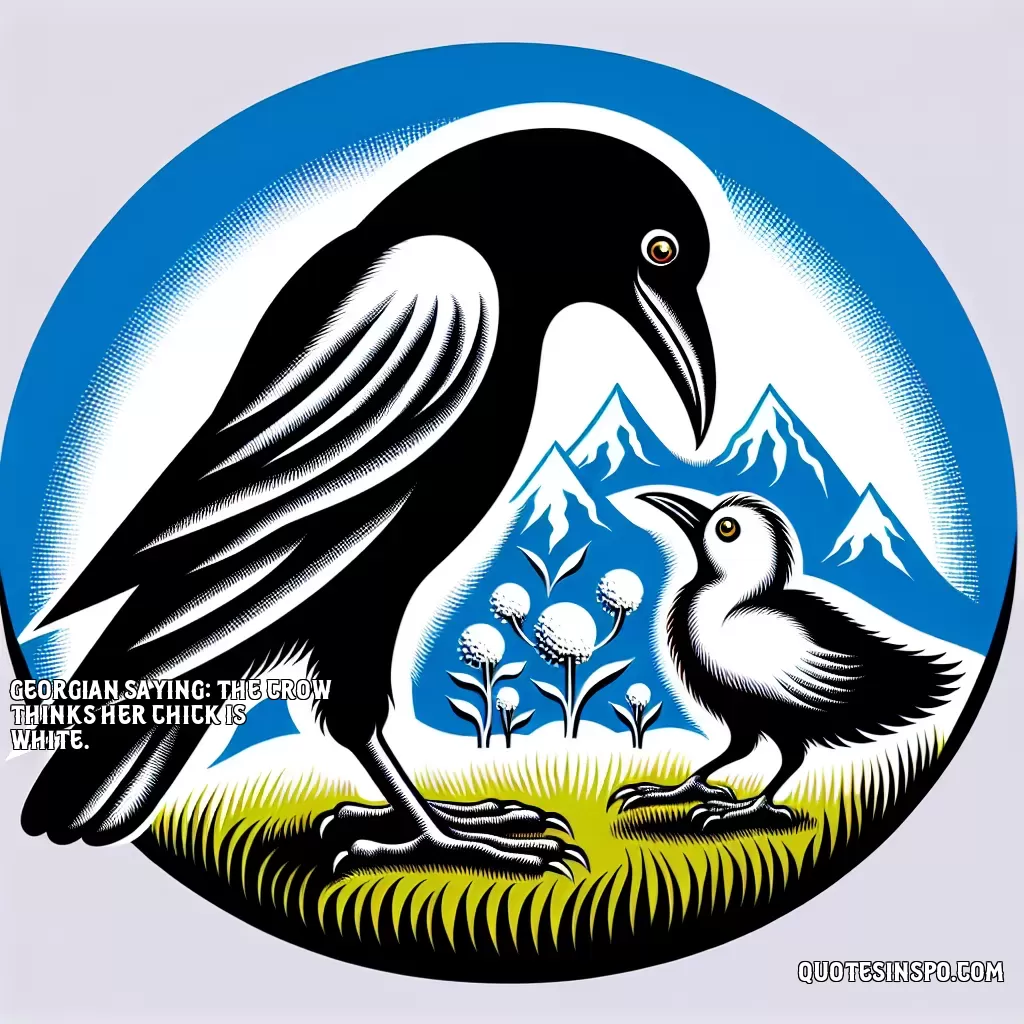
Georgian Saying: The crow thinks her chick is white.
The Georgian saying "The crow thinks her chick is white" is an evocative metaphor highlighting the concept of bias and subjective perception, particularly in the context of parental or personal pride. Crows, which are typically black, are unlikely to have a white chick, yet in the eyes of the crow, her offspring is seen as exemplary, flawless, and distinctive. This aphorism illustrates how individuals often see their loved ones, creations, or ideas through a lens that may be clouded by affection or attachment, leading to an idealized perception that diverges from reality. The saying can be extended to various aspects of human behavior, illustrating how bias affects judgment. It underscores the idea that people tend to view their own situations, relatives, or efforts with a kind of rose-colored optimism. Just as the crow's perception of her chick is not aligned with the reality of its appearance, so too might a parent's view of their child's capabilities or a creator's assessment of their work be inflated by subjective emotions. Moreover, this proverb can serve as a gentle reminder of the limitations and pitfalls of perceiving the world solely through our desires and attachments. It encourages introspection and humility, prompting us to recognize that our perspectives might be skewed by our affinities and that the impartial reality might be different. In broader societal interactions, the saying can promote empathy by acknowledging that everyone has their unique biases, which shape their understanding of the world. Embracing this wisdom can foster more accurate self-awareness and more nuanced interactions with others.
Quote By: Georgian Saying
**Understanding Georgian Sayings: A Reflection of Culture and Wisdom**
Georgian sayings, known as “tarebarebi,” are a profound aspect of Georgia's rich cultural heritage, echoing the country’s history, traditions, and collective wisdom. Renowned for their metaphorical depth and expressive nature, these sayings serve as vehicles of shared experience and moral teachings that resonate deeply within the Georgian psyche.
Author and cultural historian, Nino Kharshiladze, emphasizes that Georgian sayings capture the essence of the nation’s values, offering insights into the community's relationships, societal norms, and philosophical musings. Kharshiladze points out that many of these sayings draw upon the vast and diverse landscapes of Georgia—from its towering mountains to its vibrant valleys—suggesting that nature itself inspires much of the wisdom contained in these phrases.
For instance, a popular saying, “The mountain does not come to Muhammad, so Muhammad must go to the mountain,” illustrates the importance of initiative and adaptability, a key component of Georgian identity. Nino Kharshiladze often highlights how such sayings are instrumental in teaching lessons of perseverance and responsibility, reflecting both personal and communal challenges faced throughout Georgia’s tumultuous history.
Furthermore, Georgian sayings frequently emphasize the significance of familial bonds and hospitality, which are cornerstones of Georgian culture. Kharshiladze notes that phrases like “A guest is a gift from God” affirm the reverence that Georgians hold for hospitality, rooted deeply in their customs and everyday life. Through her extensive research, Kharshiladze brings to light how these sayings not only preserve history but also act as a dialogue between generations, ensuring that wisdom is passed down and adapted to contemporary life.
In conclusion, the wealth of Georgian sayings provides not just a linguistic treasure but also a lasting testament to the values, nature, and vibrant spirit of Georgia. As Nino Kharshiladze eloquently asserts, engaging with these sayings allows one to understand not only the language but the heart and soul of Georgian culture, making them an indispensable part of the country’s heritage and identity.